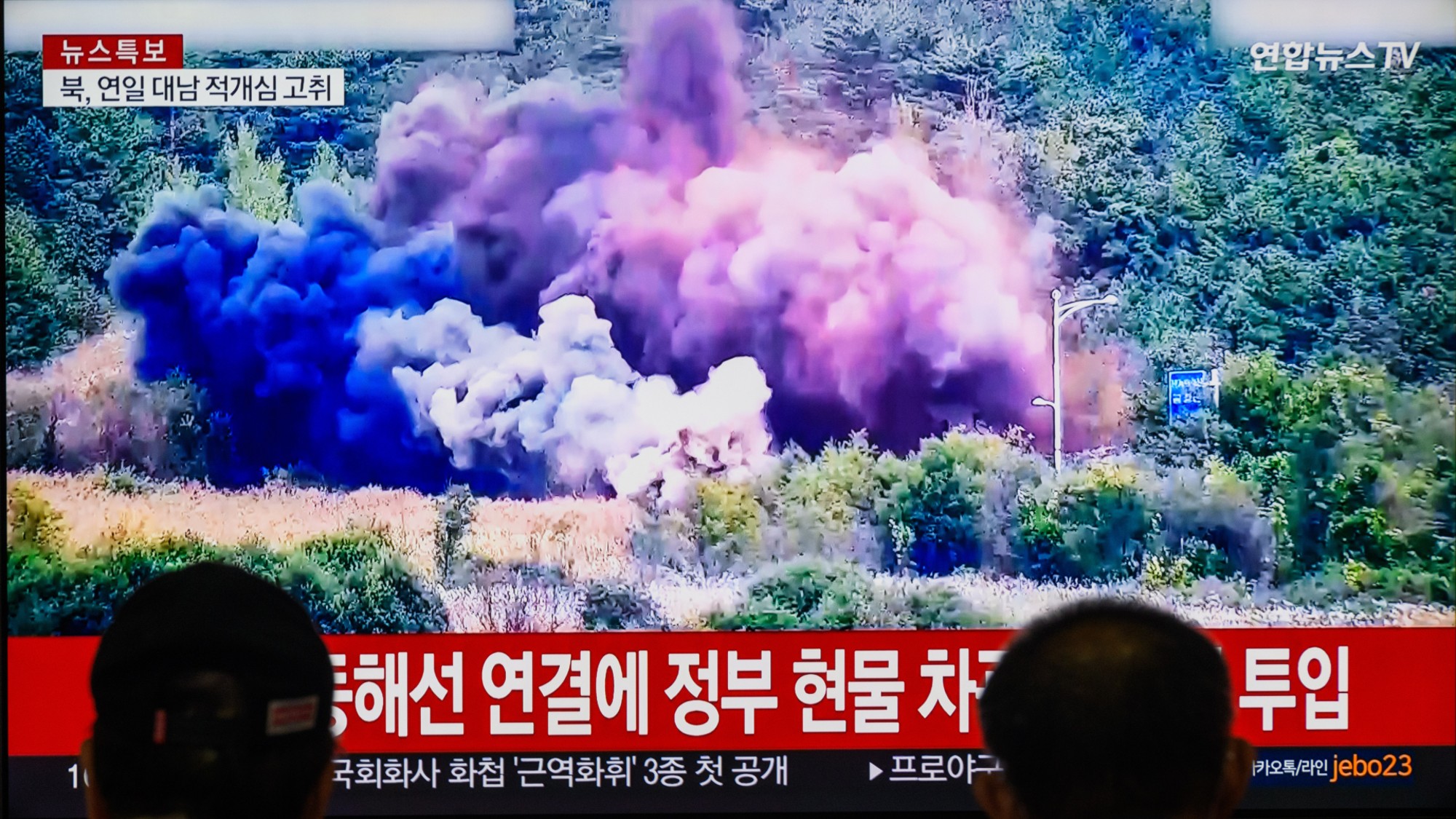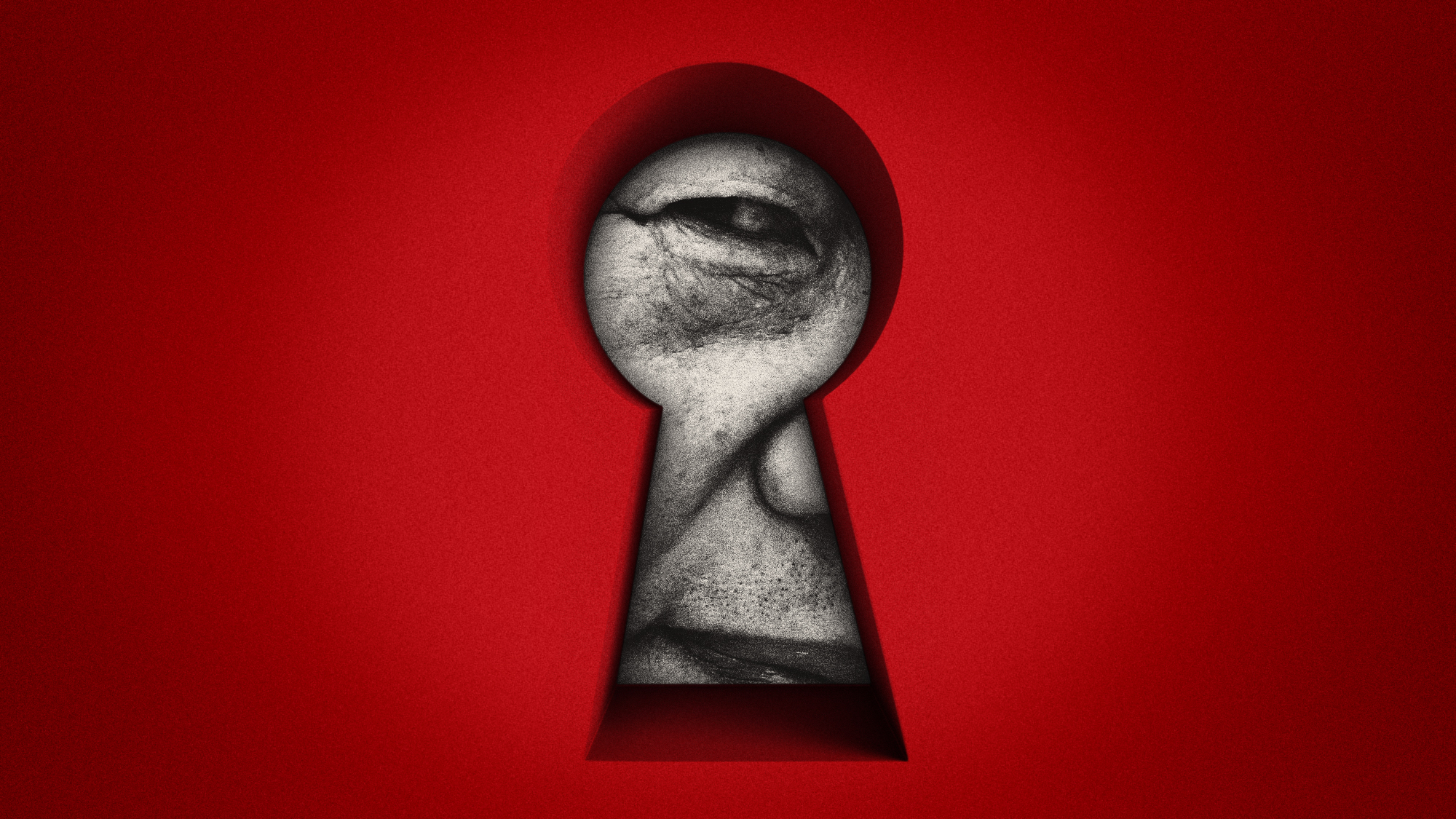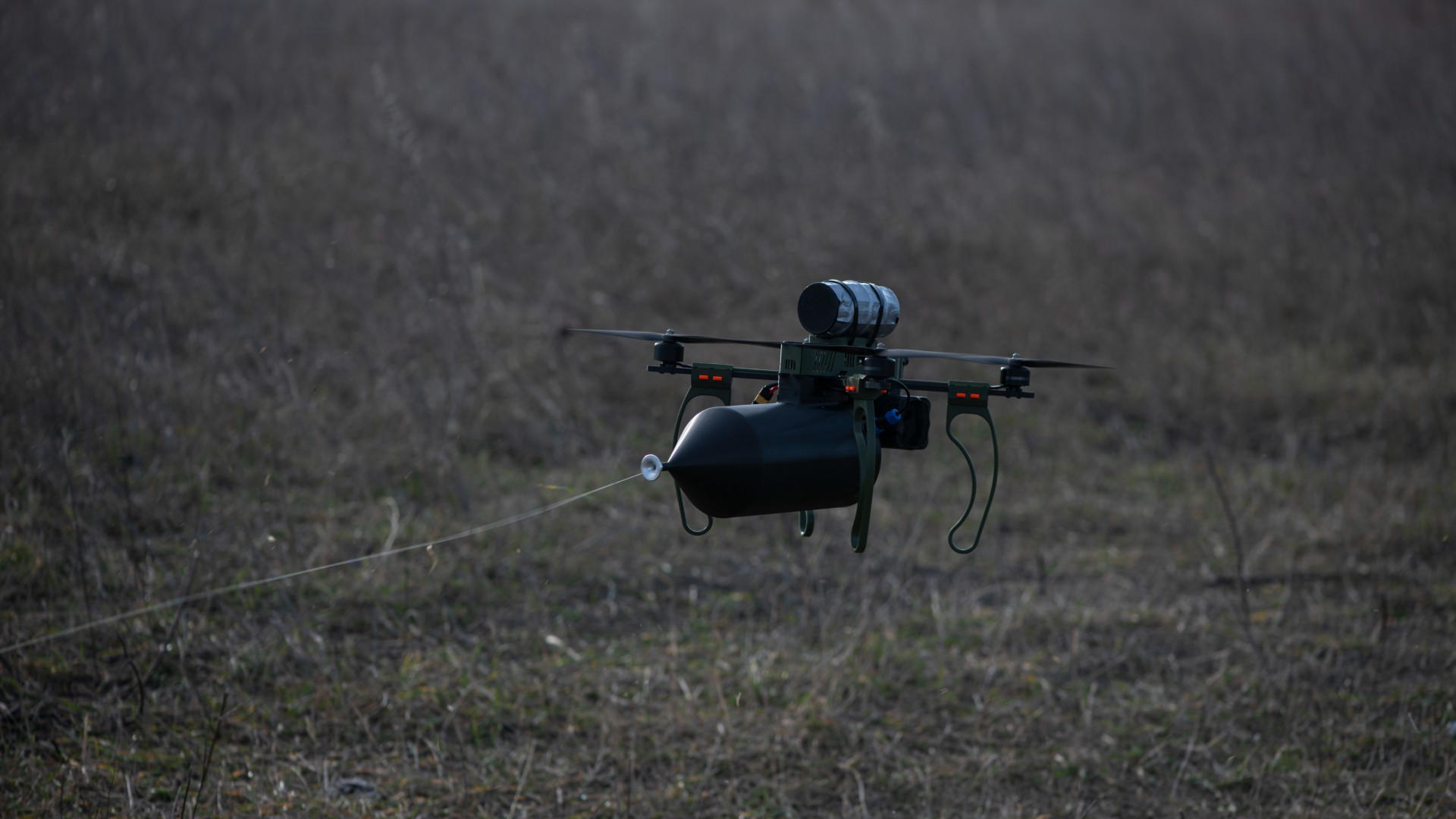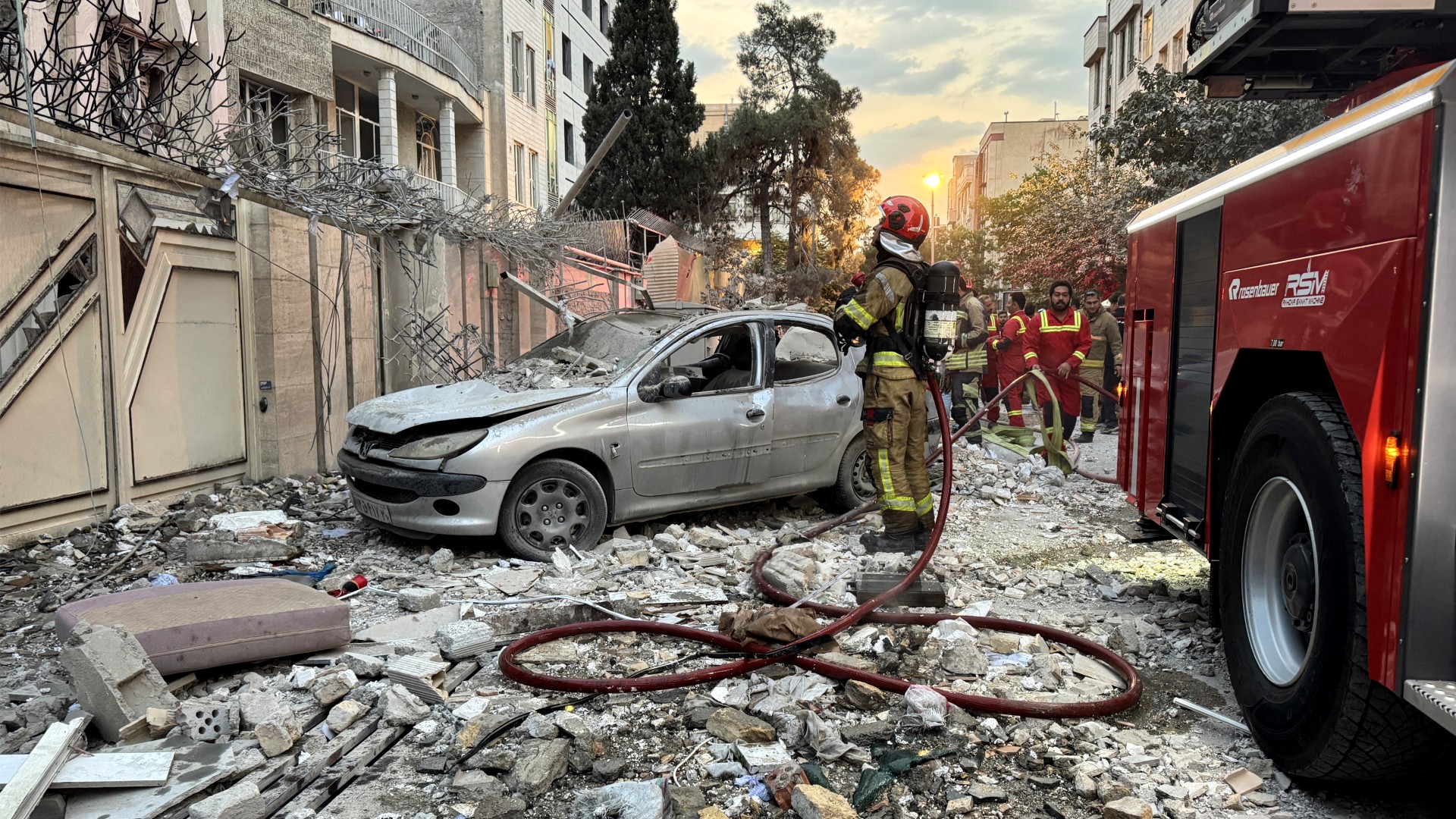What's happening at the North Korea border?
Tensions rise as hermit kingdom blows up 'symbolic' roads after accusing Seoul of flying drones over Pyongyang

A free daily email with the biggest news stories of the day – and the best features from TheWeek.com
You are now subscribed
Your newsletter sign-up was successful
Tensions on the Korean peninsula continue to rise, with North Korean state media reporting that the country has changed its constitution to define South Korea as a "hostile state".
The Pyongyang-based KCNA news agency said the recently-amended constitution "clearly defines the ROK [South Korea] as a hostile state", Reuters reported. The country's Supreme People's Assembly "had been expected to amend the constitution to officially designate South Korea as a separate country and a main enemy" at a meeting last week, but this is the first apparent public confirmation of such a move.
This week, Kim Jong Un's regime has blown up roads connecting it to the south, with Seoul firing from its side of the border in retaliation. The North accused its neighbour of engaging in "grey zone" drone operations over Pyongyang, part of "an escalation of hostility" on the Korean peninsula, where tensions were already "at their highest point in years", said the BBC.
The Week
Escape your echo chamber. Get the facts behind the news, plus analysis from multiple perspectives.

Sign up for The Week's Free Newsletters
From our morning news briefing to a weekly Good News Newsletter, get the best of The Week delivered directly to your inbox.
From our morning news briefing to a weekly Good News Newsletter, get the best of The Week delivered directly to your inbox.
What's going on at the border?
The North Korean People's Army said it blew up the roads as a "self-defensive measure for inhibiting war", in response to military exercises in South Korea and the frequent presence of US nuclear assets in the region.
South Korea's military said the explosions had not caused any damage on its side of the border, but the roads were "seen as symbolic of efforts to improve ties and, eventually, reunite the peninsula", said The Guardian.
Behind North Korea's "demolition politics" is the same "psychological game" as its destruction of the inter-Korean liaison tower in 2020, said South Korean author and commentator Sung-Yoon Lee on X. The aim is to "raise stress" and "war fear", as well as "bashing" the government of its neighbour.
The South Korean unification ministry described the North's move as "abnormal" and a violation of bilateral agreements that are supposed to reduce tensions. Its joint chiefs of staff said the military had fired "retaliatory" warning shots near the border, but didn't provide any further details.
A free daily email with the biggest news stories of the day – and the best features from TheWeek.com
How did we get here?
In January, Pyongyang constitutionally abandoned its "decades-long objective" to seek the "unification of the two Koreas", said Al Jazeera. Kim declared the South his country's "principal enemy" and the hermit kingdom has "laid fresh mines, erected anti-tank barriers and deployed missiles capable of carrying nuclear warheads", said The Guardian.
Since then, the North has unveiled a "secretive" uranium-enrichment nuclear facility, and vowed to build more nuclear weapons while continuing its record run of "provocative" missile tests, said The Associated Press. Foreign experts believe that North Korea hopes to use an expanded nuclear arsenal as "leverage to win outside concessions like sanctions relief", particularly if Donald Trump is re-elected.
What do drones have to do with it?
Tensions reached a new high when North Korea accused Seoul of flying drones over Pyongyang: a new "grey zone" attack. The drones allegedly scattered propaganda leaflets over Pyongyang in what the North described as a provocation that could lead to "armed conflict and even war". Pyongyang said last week it would permanently block its border with South Korea in response, build front-line defence structures and order border troops to be prepared to fire.
South Korea's defence ministry has denied involvement in drone flights over Pyongyang. But Seoul has warned that if the safety of its citizens was threatened, it would signal the "end of the North Korean regime". Its joint chiefs of staff said its military was maintaining "fully readiness posture under cooperation with the US".
What might happen next?
North Korea has threatened to respond with force if drone flights occur again, and to put frontline artillery and other army units on standby in such an eventuality. Pyongyang said North Korean forces would prepare "all means of attack".
The North is likely to stage more provocations, even a nuclear test explosion and a long-range missile test. Kim "has a habit of demolishing things when he is feeling cross", said The Times Asia editor Richard Lloyd Parry. Such "pointless pyrotechnics are part of North Korean rhetoric, on a par with the repeated warnings of imminent nuclear war". What was "notable" this week was South Korea's response: mysterious "counter-fire" intended to "make a point". South Korea has joined the North in "the game of setting off big bangs for rhetorical, not military, reasons". The policy of South Korea's conservative president, Yoon Suk Yeol, and his "uncompromising" defence minister is to "match North Korean provocation". But any all-out war on the peninsula would be "catastrophic", and likely to draw China into a superpower conflict.
Chas Newkey-Burden has been part of The Week Digital team for more than a decade and a journalist for 25 years, starting out on the irreverent football weekly 90 Minutes, before moving to lifestyle magazines Loaded and Attitude. He was a columnist for The Big Issue and landed a world exclusive with David Beckham that became the weekly magazine’s bestselling issue. He now writes regularly for The Guardian, The Telegraph, The Independent, Metro, FourFourTwo and the i new site. He is also the author of a number of non-fiction books.
-
 How the FCC’s ‘equal time’ rule works
How the FCC’s ‘equal time’ rule worksIn the Spotlight The law is at the heart of the Colbert-CBS conflict
-
 What is the endgame in the DHS shutdown?
What is the endgame in the DHS shutdown?Today’s Big Question Democrats want to rein in ICE’s immigration crackdown
-
 ‘Poor time management isn’t just an inconvenience’
‘Poor time management isn’t just an inconvenience’Instant Opinion Opinion, comment and editorials of the day
-
 What is ‘Arctic Sentry’ and will it deter Russia and China?
What is ‘Arctic Sentry’ and will it deter Russia and China?Today’s Big Question Nato considers joint operation and intelligence sharing in Arctic region, in face of Trump’s threats to seize Greenland for ‘protection’
-
 Is the Chinese embassy a national security risk?
Is the Chinese embassy a national security risk?Today’s Big Question Keir Starmer set to approve London super-complex, despite objections from MPs and security experts
-
 Did Trump just end the US-Europe alliance?
Did Trump just end the US-Europe alliance?Today's Big Question New US national security policy drops ‘grenade’ on Europe and should serve as ‘the mother of all wake-up calls’
-
 Vladimir Putin’s ‘nuclear tsunami’ missile
Vladimir Putin’s ‘nuclear tsunami’ missileThe Explainer Russian president has boasted that there is no way to intercept the new weapon
-
 How drone warfare works
How drone warfare worksThe Explainer From Ukraine to Iran, it has become clear that unmanned aircraft are rapidly revolutionising modern warfare
-
 How the Israel-Iran conflict broke out
How the Israel-Iran conflict broke outThe Explainer Israel's strike on Iran's nuclear and missile programmes was years in the planning
-
 Will the UK get involved in the Israel-Iran conflict?
Will the UK get involved in the Israel-Iran conflict?Today's Big Question Keir Starmer is 'walking a tightrope' in helping Israel limit Tehran's nuclear capabilities without being seen to do so
-
 Ukraine: where do Trump's loyalties really lie?
Ukraine: where do Trump's loyalties really lie?Today's Big Question 'Extraordinary pivot' by US president – driven by personal, ideological and strategic factors – has 'upended decades of hawkish foreign policy toward Russia'